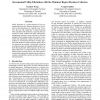Free Online Productivity Tools
i2Speak
i2Symbol
i2OCR
iTex2Img
iWeb2Print
iWeb2Shot
i2Type
iPdf2Split
iPdf2Merge
i2Bopomofo
i2Arabic
i2Style
i2Image
i2PDF
iLatex2Rtf
Sci2ools
IJCAI
2003
2003
Incremental Utility Elicitation with the Minimax Regret Decision Criterion
Utility elicitation is a critical function of any automated decision aid, allowing decisions to be tailored to the preferences of a specific user. However, the size and complexity of utility functions often precludes full elicitation, requiring that decisions be made without full utility information. Adopting the minimax regret criterion for decision making with incomplete utility information, we describe and empirically compare several new procedures for incremental elicitation of utility functions that attempt to reduce minimax regret with as few questions as possible. Specifically, using the (continuous) space of standard gamble queries, we show that myopically optimal queries can be computed effectively (in polynomial time) for several different improvement criteria. One such criterion, in particular, empirically outperforms the others we examine considerably, and has provable improvement guarantees.
| Added | 31 Oct 2010 |
| Updated | 31 Oct 2010 |
| Type | Conference |
| Year | 2003 |
| Where | IJCAI |
| Authors | Tianhan Wang, Craig Boutilier |
Comments (0)

